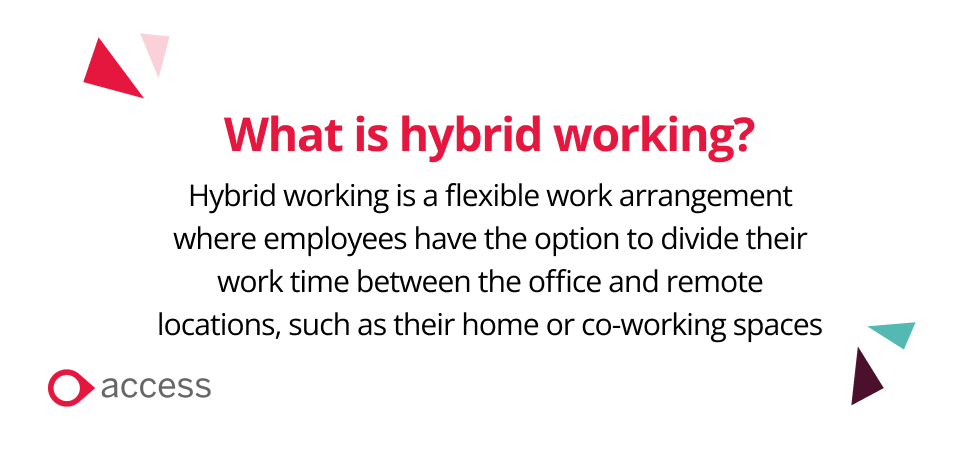
What does hybrid working mean?
Hybrid working is a flexible work arrangement where employees have the option to divide their work time between the office and remote locations, such as their home or co-working spaces.
In a hybrid working model, individuals typically have the autonomy to choose where they work based on the nature of their tasks, personal preferences, and the needs of their team or organisation. This dynamic approach blends the benefits of in-person collaboration and interaction with the flexibility and autonomy of remote work, aiming to enhance productivity, work-life balance, and overall job satisfaction. Working from home is the most common option for people working remotely, and often the only option for certain roles, such as those for deskless employees.
There are several different hybrid working models available. However the two most common models include:
Flexible hybrid work model
A flexible hybrid work model allows employees to choose both their working location and hours, depending on what their priorities are that day. A good example of this would be if an employee was working on a project that required a lot of focus, they may choose to work from home. However, if they are working on a group project they may choose to work from the office with their colleagues.
Fixed hybrid work model
When it comes to a fixed hybrid work model, the organisation will outline the days and times employees are required to work from the office and when they can work remotely. It is common practice for different departments to have set days within the office, to allow for a more collaborative set up.
Benefits of Hybrid Working
Hybrid working offers many benefits, empowering both employers and employees to thrive in today's dynamic work environment. Let's explore each of these further...
Benefits of Hybrid Working for Employees
1. Increased flexibility
Hybrid working affords employees greater flexibility and control over their schedule, adapting to individual needs and preferences. By offering the option to work remotely or from the office or adjust their hours of work, individuals can choose the setting and times that allows them to be most productive.
2. Better work-life balance
Having the autonomy to choose when and where they work enables employees to maintain both their professional and personal responsibilities, improving their work-life balance. This is crucial for employees as it allows them to maintain both their physical and mental health, nurture personal relationships and pursue interests outside of work.
3. Improved well-being and job satisfaction
When employees have a sense of freedom, not only does their productivity increase but it can also have a positive impact on their job satisfaction. This in turn leads to improved employee engagement, and their overall wellbeing.
4. Reduced costs
From the cost of fuel, public transport, tolls and parking fees, commuting to work can be expensive. As well as this, working from the office can lead to other cost considerations such as lunches and office wear. With this approach, employees can significantly cut down on these expenses whilst creating a more cost-effective workspace at home.
5. Builds a culture of trust
When an organisation adopts a hybrid approach, employees feel empowered to get the job done no matter what their physical location may be. Demonstrating confidence in your team to be productive regardless of their location helps to builds a positive culture of trust within an organisation.
Benefits of Hybrid Working for Employers
1. Attracting and retaining talent
When it comes to attracting and retaining businesses that operate a hybrid working policy tend to appeal to a broader pool of candidates. Offering this level of flexibility demonstrates a business's commitment to their employee's wellbeing and satisfaction, attracting those who seek a better work-life balance. It also widens the talent pool to include individuals outside of regular commuting distance.
2. Enhanced productivity and focus
Whilst some employees may find themselves distracted by the day-to-day when working from home, others find that working from home frees them of office distractions. When given the flexibility to choose where to work, employees can tailor their environment to minimise distractions and enhance productivity.
3. Potential cost savings
With fewer people in the office at the same time, large workspaces are no longer necessary meaning that businesses can look to downsize their spaces. This also means that offices are consuming fewer resources including office supplies and utilities such as power, water and heating, lowering a business’s fixed costs.
4. Reduced absenteeism
Adopting a hybrid approach can also help improve employee absenteeism, reducing the number of sick leave an employee takes. The increase in job satisfaction and wellbeing combined with the autonomy and flexibility of managing their own work schedules, leaves employees feeling less pressure and stress during their workdays, creating a more relaxed working environment.
Challenges of Hybrid Working
When it comes to successfully implementing a hybrid working model, modern workplace technology is key. Without robust tools like cloud-based communication, collaboration platforms and comprehensive HR software featuring HR chatbots, businesses, in particular small to medium sized businesses, may find themselves ill-equipped to harness the potential of hybrid work.
This can lead to various challenges, including:
- Communication and collaboration barriers
With many employees choosing to work from home, teams may come up against several communication barriers. One potential issue is the lack of spontaneous interactions that naturally occur in a traditional office setting. Limited access to effective digital communication tools may also result in misunderstandings which can cause friction within teams.
- Maintaining company culture and team cohesion
Similarly, hybrid working introduces complexities in maintaining a positive company culture. Without the daily interactions and shared experiences that occur in the office, workers have less chance to bond and form a strong culture. This can lead to reduced engagement, impacting morale and team dynamics.
- Ensuring equity and fairness for all employees
When embracing a hybrid working model, it's important to ensure equity and fairness for all employees. Employers must ensure that every team member can work remotely part of the time, whether it be providing the necessary equipment or ensuring they have access to high-speed broadband.
The Future of Hybrid Work
So, is hybrid working here to stay?
Well, with employees seeking flexibility and autonomy in their work environments, and revaluating their work-life balance, the desire for hybrid work options that blend remote and in-office arrangements continues to rise.
As of 2023, 44% of UK British People work from home at least some of the time, whether that be through a hybrid working model or full-time remote working, it doesn’t look like this figure is going to drop any time soon. Businesses that can adapt to this shifting landscape stand to reap significant rewards, including improved employee satisfaction, retention, and productivity.
When it comes to driving the adoption of hybrid working arrangements, technological advancements play a pivotal role:
- Cloud-based communication and collaboration tools have become indispensable in facilitating seamless interaction amongst teams,
- Integrated HR systems enable greater productivity across workforce management and engagement
However, a lack of effective systems such as these can directly impact an employer's ability to develop a successful hybrid working model and accommodate hybrid work requests. Without robust HR software to streamline processes such as scheduling, performance tracking, and employee engagement, businesses may struggle to effectively manage a remote workforce and maintain cohesion across teams.
Implementing tailored HR software aids small to medium-sized businesses in managing hybrid work setups, encouraging communication, and ensuring fairness. With the right technology, companies can optimize hybrid work arrangements and prepare for future success.
Summary
Hybrid working combines remote and in-office setups, providing flexibility and autonomy for employees and employers. While it offers benefits like improved work-life balance and increased productivity, challenges such as communication barriers and maintaining company culture can arise. Nevertheless, with many UK workers already embracing remote work, businesses adapting to this new HR industry trend stand to benefit. Cloud-based HR software like PeopleHR streamlines hybrid work implementation, helping businesses navigate challenges effectively.
Access PeopleHR empowers businesses to seamlessly integrate hybrid working. Watch our 4 minute demo and explore how our solution can optimise your operations and support your workforce, regardless of location.
You might be interested in:
Did you find this article helpful? If so, be sure to check out our related posts:
